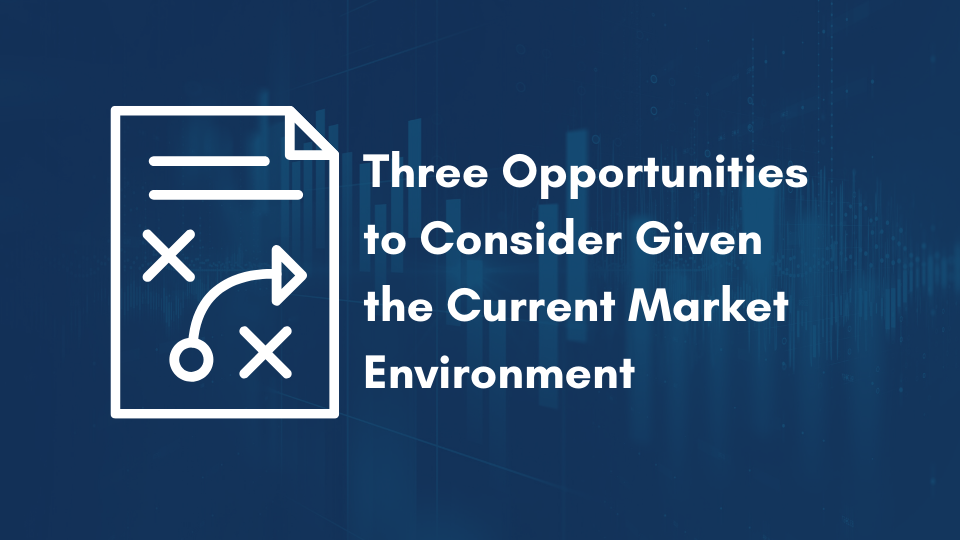
Understanding the Deductibility of Meals for 2024 Tax Returns
Proper classification of meal expenses can help businesses maximize deductions while staying compliant with IRS regulations. Here’s what business owners need to know: 1. 50%…


The current market environment could provide an opportunity to refinance your mortgage, rebalance your portfolio, or relook at your excess cash.
Some of you may have read our market update last week concerning the developing coronavirus situation. While the impact of its effects remains unknown, rest assured that we will continue to monitor the markets very closely on your behalf as conditions like these also present unique opportunities…to those paying attention!
Our investment philosophy is not based on trying to make predictions about the future. Instead, we will rely on a strict rebalancing standard to ensure that your portfolio remains on target with your personal risk tolerance. Though the stock market has proven challenging the last several weeks, such volatility is not unprecedented. We’ve seen stock market reactions such as this before. The key principles for a successful investor are faith, patience, and discipline. And while we’re keenly focused on the long-term, the events of the last several weeks may present a few unique opportunities for the near-term.
Opportunity #1 –
The Federal Reserve this week took proactive measures to combat the economic impact of the coronavirus by lowering interest rates 0.50%. As a result, mortgage rates have fallen to near-historic lows. For those with a mortgage, now might be a good time to explore refinancing opportunities; however, refinancing may not be suitable for everyone. Closing costs are always a consideration, so we suggest first connecting with your banking institution to ask for a proposal. Generally speaking, refinancing long-term debt is a good idea and worthy of incurring some expense, if you can lower your interest rate by at least 0.75% – 1.00%. If you’re planning to stay in your current home for several years to come, lowering your interest rate could save you a meaningful amount of interest in the coming years. However, if you’re planning to move or are fortunately mortgage-free, then no action is necessary.
Opportunity #2 –
As mentioned in the opening paragraph, we monitor client portfolios daily to identify potential rebalancing opportunities at each individual asset class level based on academic research and a well-defined criteria approved by our Investment Committee. The execution of this strategy allows us to sell fixed income within a portfolio (which have recently appreciated from falling interest rates) and use those proceeds to purchase equities at lower prices. Selling high and buying low is a money-making strategy very few disagree on. This is not our admission that we’ve reached a bottom in equity prices as that is unpredictable. Should global equities continue a decline, we’re prepared to rebalance a second time, if necessary. Rebalancing is not an attempt to fish for the bottom, rather, a proven method for adding value in a portfolio without having to deal with emotions. Your portfolio will tell us when it is time to rebalance based on when it crosses through our predetermined thresholds. If you’ve received trade confirmations in the last week, it’s likely that we’ve executed on this rebalancing strategy and brought your portfolio back to target.
Opportunity #3 –
For those clients who have excess cash, perhaps this stock market correction is a fair time to consider adding a portion of your cash to your long-term investment portfolio. As mentioned before, discipline is a key characteristic of successful investors. Those willing to buy equity, even in the face of uncertainty, will be rewarded for that risk over time. If you have cash that remains on the sidelines, this temporary stock decline may give you an opportunity to get those dollars working for you. Depending on the amount of available cash relative to your portfolio size, your Beaird Harris wealth manager can speak with you about the most suitable contribution strategy and how it aligns with your personal financial plan. We have been pleased that many of our clients who are focused on long-term returns have already proactively reached out to us to discuss adding to their portfolios.
At Beaird Harris we believe that temporary market declines provide opportunities for well-educated investors to make informed decisions to further the potential success of their financial future. If you have any questions, please contact your Beaird Harris wealth manager.
Return to COVID-19 Response & Resources
Please remember that past performance may not be indicative of future results. Different types of investments involve varying degrees of risk, and there can be no assurance that the future performance of any specific investment, investment strategy, or product (including the investments and/or investment strategies recommended or undertaken by Beaird Harris Wealth Management, Inc.), or any non-investment related content, made reference to directly or indirectly in this blog will be profitable, equal any corresponding indicated historical performance level(s), be suitable for your portfolio or individual situation, or prove successful. Due to various factors, including changing market conditions and/or applicable laws, the content may no longer be reflective of current opinions or positions. Moreover, you should not assume that any discussion or information contained in this blog serves as the receipt of, or as a substitute for, personalized investment advice from Beaird Harris Wealth Management, Inc. To the extent that a reader has any questions regarding the applicability of any specific issue discussed above to his/her individual situation, he/she is encouraged to consult with the professional advisor of his/her choosing. Beaird Harris Wealth Management, Inc. is neither a law firm nor a certified public accounting firm and no portion of the blog content should be construed as legal or accounting advice. A copy of the Beaird Harris Wealth Management, Inc.’s current written disclosure statement discussing our advisory services and fees is available for review upon request.

Proper classification of meal expenses can help businesses maximize deductions while staying compliant with IRS regulations. Here’s what business owners need to know: 1. 50%…

President Trump signed legislation repealing IRS reporting rules for decentralized finance (DeFi) platforms, easing compliance burdens but leaving individual taxpayers responsible for accurate crypto reporting.

Certain non-traditional investments held in an IRA — like active business interests or leveraged real estate — can trigger Unrelated Business Income Tax (UBIT), potentially…
Schedule a complimentary call today. We’ll help you get started and learn more about Beaird Harris.